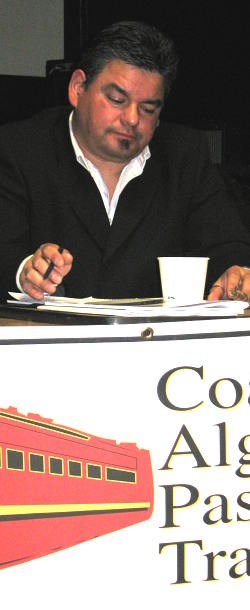"Frankly, I really don't think the private sector gives a damn about anyone," says Serpent River Chief and Lake Huron Regional Chief Isadore Day.
"It's important to follow the money," says Chief Day (shown). "The social contract must come first before any deals between government and private businesses."
Day was part of a panel of speakers at a town hall meeting organized by the Coalition for Algoma Passenger Trains (CAPT) and Northern Ontario Research, Development, Ideas, and Knowledge (NORDIK) to discuss the urgency of securing effective train service for Algoma.
He cautioned participants to make sure their tax dollars do not go to companies that will run the rail lines for five to 10 years, then take the money invested by government when they leave.
Day also said that, while it's important to learn from the past so we can improve what we do in the future, romantic notions of passenger trains in days gone by will not secure the service into the future.
"The right to passenger rail is obvious and with that right comes responsibility," he said. "We want to figure out our responsibilities in this."
Day told the Friday-night meeting that there is still hope for passenger rail in Northern Ontario.
He said that regional First Nation communities are onside with the Coalition for Algoma Passenger Trains and that, together with other communities in the North, they could make a strong business case to convince government to preserve and improve passenger rail service.
Other participants were quick to support Chief Day's assessment of the situation and to expand on it.
"It costs $10 million per kilometre of divided highway," said CAPT co-chair Al Errington. "There is about 300 kilometres between here and Sudbury. To put the numbers in perspective, the salvage value of the track between here and there is $25 million and it would take about $75 million to completely do everything it needs. That's about one-third the cost of building a divided highway all the way to Sudbury."
One participant suggested that shippers may not want to move freight by rail because it isn't reliable or fast enough.
Errington replied that might be true for now, but it's because the rail companies hold a monopoly on each section of track.
"They don't have to run on time or deal in anything but bulk freight," he said. "They can just skim the gravy because people have no alternative."
As an alternative, Errington suggested the government buy back the rail infrastructure and open it to businesses to buy, maintain and operate rolling stock on the rail bed in a competitive market.
"That's the way they do things with the highways, why not the railways?" Errington asked.
The idea was warmly greeted with applause and statements of support from the floor.
Other speakers stressed the need for passenger rail, even over the need for freight transportation.
Diane Morrell from the Canadian Paraplegic Association and Amie Harnish, a student representative from Algoma University, talked about the social impact of rail transportation on students and on people with disabilities.
"Imagine you are a person with a mobility disability," Morrell said. "You probably need specialized medical care that is not available to you in your community. How do you think you are going to get to where you need to go?"
Morrell described what sort of vehicle would be needed to transport a person with mobility needs and his or her wheelchair, pointing out that few could afford such modifications.
Even if buses were equipped to transport people with physical disabilities, service to much of Northern Ontario is expected to end in a few weeks.
"The need for accessible passenger rail is even greater now," Morrell said. "They are isolated and unable to access the care they need. Part of our social responsibility is to take care of our most vulnerable citizens."
She said there are problems with passenger trains running in the North now but these could be addressed.
Some doors need to be wider and there should be lifts at more locations so people can board trains in their wheelchairs.
Harnish talked about rail as a viable alternative for people living in rural or isolated communities who want to go to postsecondary schools but can't afford to buy a vehicle.
She said such alternative transportation would greatly increase the quality of life for people living in the region, and would also increase the chances that young people living here won't leave and those coming from other areas to attend school will stay.
Dr. Nairne Cameron, a geography professor at Algoma University, talked about the shift to a post-carbon economy.
Professor Cameron said this shift is inevitable and rail transportation of both goods and people will be a vital link in a post-carbon world.
"Whatever we do, we can't wait until it's upon us," she said. "It's important we begin to prepare now because we really don't know how much longer people are going to be able to drive cars around and live they way they live now."
Cameron also suggested that people consider electric locomotives because diesel fuel is going to be difficult to get and very expensive as the world's fossil fuel supply dries up.
Participants watched a short video describing the implications of peak oil on long-distance travelling.
Proponents of the peak oil concept say that high dependence of developed and developing nations on petroleum products to build roads, grow food, move goods and people, and build cities, leave those nations vulnerable.
They say that the world cannot produce much more oil than now and demand is rising steadily, so prices will rise until it's unaffordable and the global economy is profoundly negatively affected.
Dr. Cameron suggested electric rail transportation would play a key role in the continuing survival of Northern Ontario people in a post-peak oil world.
